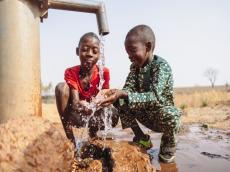|
|
TODAY.AZ / World news
Ensuring universal access to safe water and sanitation: Critical challenge for 2030
27 August 2024 [23:31] - TODAY.AZ

Access to safe water, sanitation, and hygiene is fundamental for health and well-being. According to the UN, if progress does not accelerate, billions will lack these essential services by 2030, Azernews reports.
Rising demand for water, driven by population growth, urbanization, and increased needs from agriculture, industry, and energy, is outstripping supply. Currently, half of the world's population faces severe water scarcity at least one month each year—a situation expected to worsen with climate change.
To meet future needs, investments in infrastructure, sanitation, and water-related ecosystem protection are crucial. Enhancing water-use efficiency is a key strategy to reduce stress on water resources. Positive strides have been made, with access to safely managed drinking water rising from 69% to 73% between 2015 and 2022.
Water access is a human right essential for health, poverty reduction, food security, and education. Addressing the challenges of water scarcity, pollution, and degraded ecosystems requires increased investment, innovation, cross-sectoral cooperation, and a holistic approach to water management.
In 2022, 2.2 billion people still lacked safely managed drinking water, 3.5 billion lacked proper sanitation, and 2 billion lacked basic handwashing facilities. Without improved infrastructure and management, water-related diseases will continue to claim lives and threaten biodiversity and ecosystem resilience.
Civil society organizations play a crucial role in holding governments accountable, investing in water research, and including diverse communities in water governance. By promoting awareness and action, we can achieve sustainability and protect both human and ecological systems.
Get involved by supporting World Water Day and World Toilet Day campaigns to drive action on hygiene issues and improve global water and sanitation access.
URL: http://www.today.az/news/regions/252211.html
 Print version
Print version
Connect with us. Get latest news and updates.
See Also
- 15 November 2024 [23:30]
United States deploys naval reconnaissance aircraft in Scotland - 15 November 2024 [22:27]
Schumacher's latest car is up for auction - 15 November 2024 [21:46]
Tbilisi City Hall allocated 8.6 million lari for New Year's events - 15 November 2024 [20:48]
Iran prepares to treat women who violate hijab law - 14 November 2024 [23:45]
Minister Bayraktar emphasizes Turkiye's role in net zero emissions - 14 November 2024 [23:26]
Poland deployed South Korean K2 tanks near border with Russia - 14 November 2024 [22:50]
Pentagon spent $1 billion on the US military industry - 14 November 2024 [21:40]
US budget deficit quadrupled in year - 14 November 2024 [20:19]
Impressive warehouse discovered in Turkiye - 14 November 2024 [18:48]
Armed robot dog 'BARS' shows off in sniper competition
Most Popular
 Provocateur Le Pen go to jail
Provocateur Le Pen go to jail
 Azerbaijan's Leadership at COP29: Addressing Global Climate Challenges and Exposing Hypocrisy
Azerbaijan's Leadership at COP29: Addressing Global Climate Challenges and Exposing Hypocrisy
 Macron Stung by President Ilham Aliyev's Truth: French Minister Ordered to Skip Baku Visit
Macron Stung by President Ilham Aliyev's Truth: French Minister Ordered to Skip Baku Visit
 Who uses Greta Thunberg and how?
Who uses Greta Thunberg and how?
 Climate Platform for business, investment & philanthropy launched within COP29
Climate Platform for business, investment & philanthropy launched within COP29
 United States announced plans to deepen security cooperation with Indonesia
United States announced plans to deepen security cooperation with Indonesia
 Azerbaijan’s COP29 presidency sets precedent with focus on amplifying voices of vulnerable nations
Azerbaijan’s COP29 presidency sets precedent with focus on amplifying voices of vulnerable nations
